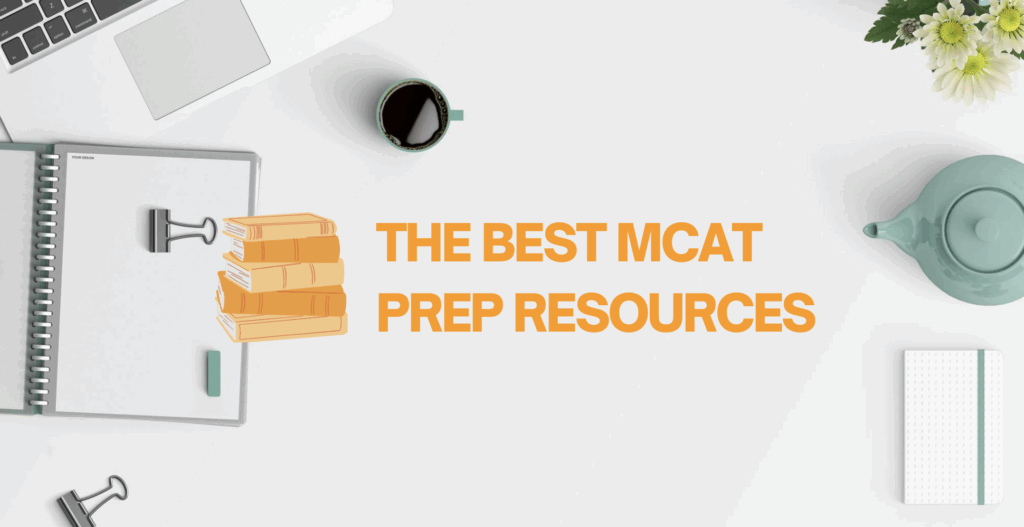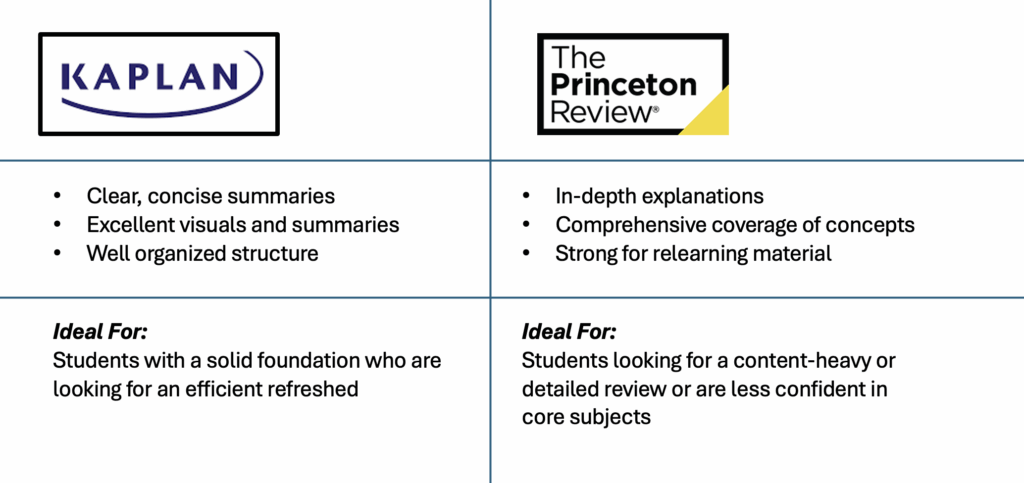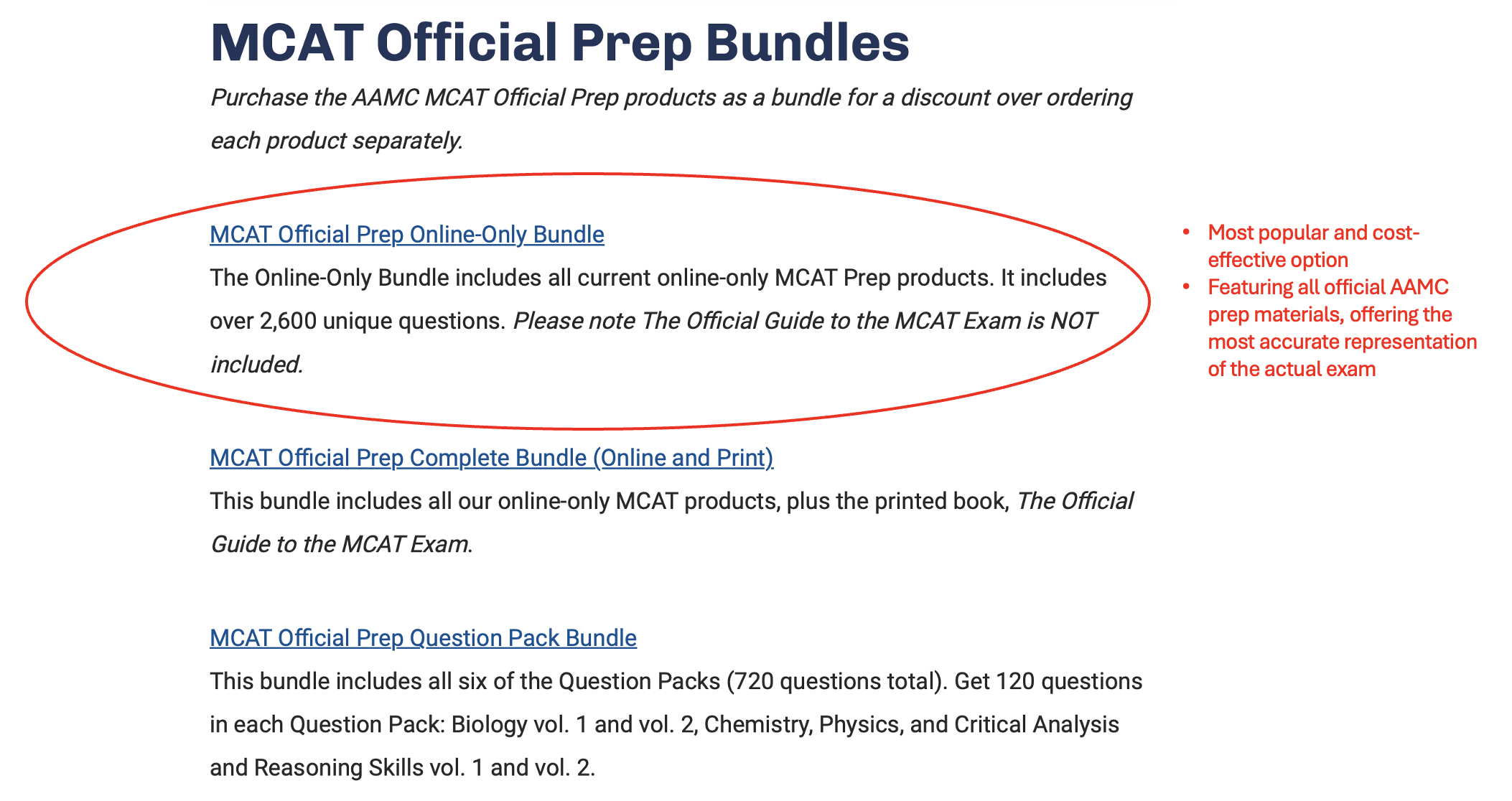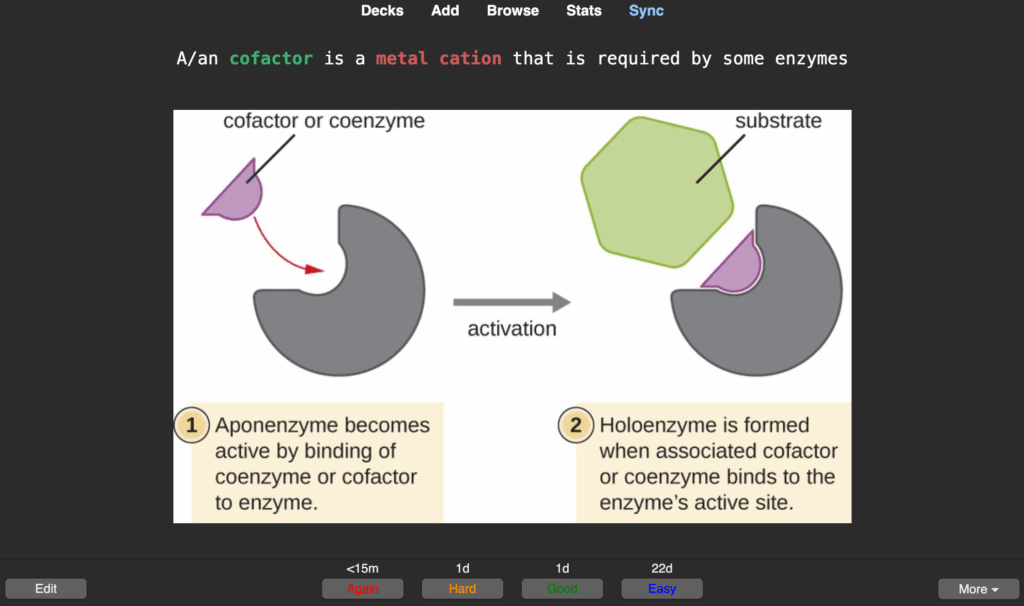If you’re gearing up for the MCAT, you’ve probably already discovered how overwhelming the prep world can be. There’s no shortage of books, question banks, full-length exams, YouTube channels, and Reddit threads to sift through. But when you strip away the noise, a few key resources consistently stand out for their quality, depth, and bang for your buck.
This guide outlines the most essential MCAT study materials, those that consistently help students score in the 510+ range and includes practical ways to reduce your expenses without compromising your preparation.
Need more specific help? Check out our guides and learn how to ace the Chemistry & Physics, CARS, Biology & Biochemistry, and Psychology & Sociology sections.

1. Kaplan and Princeton Review: Content Review
Kaplan and The Princeton Review (TPR) are two of the most popular and reputable MCAT content review book sets. Both cover the full scope of MCAT subjects: biology, biochemistry, general and organic chemistry, physics, psychology, sociology, and CARS (Critical Analysis and Reasoning Skills).
Kaplan is widely praised for its clear structure and concise explanations. It presents high-yield information in an organized and digestible format, making it ideal for students who have a solid foundation from their prerequisite courses and are looking for an efficient, targeted review.
The Princeton Review on the other hand, is more detailed and explanatory. It includes extensive background information and in-depth coverage of foundational concepts. This makes it a strong choice for students who need a more comprehensive review—whether they’re revisiting material after a long gap, want to reinforce weaker subjects, or simply prefer a more content-heavy approach. Personally, I chose The Princeton Review because I wanted a thorough resource that covered all the finer details.

Recommendation: Choose Kaplan for a more efficient review and TPR for a deeper dive into the content. Both are strong choices and there are plenty of students who excel with either set of textbooks.
Cost-Saving Tip: These books are incredibly easy to find secondhand. I bought a new set of textbooks, but this was easily my biggest regret through the process. Look on platforms such as eBay, Kijiji, or Facebook Marketplace for students selling their used textbooks, often which are near perfect condition. Editions can remain relevant for several years, so even an older version (2020 or later) will serve you well. Some university libraries also stock full sets for loan.
2. UWorld: High-Yield Question Bank
UWorld is a practice question platform that has become a cornerstone of MCAT preparation for many high-scoring students. It contains over 2,000 questions that closely mimic the MCAT’s style, particularly in the science sections. Each question is accompanied by detailed explanations that reinforce content knowledge and highlight logical reasoning.
UWorld is most effective after completing a first pass of content review. It allows students to solidify concepts, identify weaknesses, and develop test-taking strategies.
Recommendation: Begin using UWorld midway through your preparation. Aim to complete the entire question bank by test day, reviewing incorrect answers thoroughly.
Cost-Saving Tip: Consider sharing an account with a study partner. UWorld allows access on multiple devices, and while this is unofficial, many students successfully study in this way. Occasionally, UWorld offers student discounts through school partnerships or limited-time promotions.
3. Blueprint Full-Length Exams: Realistic 3rd Party Practice Tests
Blueprint (formerly known as Next Step) offers full-length practice exams that are widely considered the most realistic third-party exams in terms of format, difficulty, and analytics. The platform is especially praised for its CARS section and post-exam diagnostics, which help students track performance across content areas and question types.
These exams are particularly useful for building stamina, refining time management, and simulating real test conditions.
Recommendation: Take four to six Blueprint exams during the second half of your study period. Then transition to AAMC exams as your test date approaches.
Cost-Saving Tip: Blueprint offers a free diagnostic full-length exam and sample question bank, which can be used early in your prep. Additionally, many students sell discounted or unused exams online after completing their test, often on Reddit or premed Discord groups.
4. AAMC Official Materials
The AAMC products provides the most accurate representation of what you will encounter on the actual MCAT. Its prep bundle includes question packs, the section bank, and four full-length exams.

The Section Bank is especially valuable, with its dense and challenging passages in biology, biochemistry, and chemistry/physics. These questions reflect the most critical reasoning skills and scientific thinking tested on the MCAT.
The Question Packs, although easier, offer additional practice for CARS and psychology/sociology. They are ideal for use earlier in your study schedule.
The Full-Length Exams (FLs 1–4) are essential for final test preparation. They mirror the actual MCAT format and provide a reliable gauge of your readiness.
Recommendation: Work through the Section Bank thoroughly, use the Question Packs for supplemental practice, and take all four full-length exams under timed conditions in the final month.
Cost-Saving Tip: Purchase the full AAMC bundle instead of individual products to save significantly. Some universities provide institutional access or reimburse students for AAMC materials so speak with your premed advisor to find out if these options are available. You may also find discounted access codes being offered on forums.
5. Jack Westin Daily CARS Passage
CARS is a uniquely challenging section that does not rely on memorization but rather on reading comprehension, critical thinking, and the ability to interpret tone and logic. Jack Westin provides both free and paid resources designed specifically to strengthen these skills.
The platform provides free daily CARS passages with explanations, which are perfect for developing the reading stamina and critical thinking mindset required for this section. I made it a habit to complete a Jack Westin passage every day. The logic and question style are fairly similar to those found in official AAMC materials and the actual MCAT, making it an excellent resource for repetitions.
For students who struggle significantly with CARS, the paid course provides more structured instruction, however many students will suffice with the daily free passages.
Recommendation: Start incorporating one CARS passage per day early in your study schedule. Use Jack Westin’s free passages to build consistency, then supplement with the AAMC CARS question packs closer to test day.
Cost-Saving Tip: Many students reach competitive CARS scores using only the free resources. If you do consider the course, check Reddit for promotional codes and student discounts that are occasionally available.
6. Khan Academy MCAT Videos
Khan Academy offers a complete MCAT video series covering every subject tested on the exam. The videos structure the AAMC’s official content outline and explain key concepts in a clear, visual format.
These are especially helpful for visual and auditory learners, or for reinforcing topics that may not have been fully grasped during reading.
Recommendation: Use Khan Academy during content review or as a supplement when revisiting weak areas. Many students integrate these videos while reading Kaplan or Princeton Review to reinforce understanding.
Money-Saving Tip: Khan Academy is completely free and remains one of the best no-cost resources for MCAT preparation. Download playlists for offline access or listen on the go for passive review.
7. The 300-Page Khan Academy Psychology/Sociology Document
Compiled by students based on the Khan Academy video series, this document distills the entire Psychology and Sociology curriculum into 300 high-yield pages. It is one of the most widely used resources for the Psych/Soc section and is considered essential by many top scorers. I used this document exclusively and scored 130+ in the Psychology/Sociology section both times I wrote the MCAT.
The document includes definitions, examples, and summaries organized according to the AAMC content categories. It is ideal for both initial review and final reinforcement.
Recommendation: Begin using the 300-page document after watching the relevant Khan Academy videos. Highlight unfamiliar terms, create flashcards, and revisit key concepts during your final review weeks.
Money-Saving Tip: This document is freely available online through Reddit and premed Discord groups. Search “300 page Khan Academy P/S document” and verify that you are using the most updated version (usually 2020 or later).
8. Anki: Powerful Spaced Repetition Flashcards
Anki is widely recommended among MCAT students for retaining vast amounts of content while reviewing with books like Kaplan or Princeton Review. It uses spaced repetition, helping you remember information more efficiently over time.
Here are some of the most popular MCAT decks ranked by comprehensiveness:
- Aidan: The most comprehensive deck available, with around 15,000 cards. Ideal for students aiming for top-tier scores in the 520+ range.
- JS (Jacksparrow): Probably the most famous deck. It’s perfect if you want a balanced approach, such as reading a Kaplan book and reviewing about 50 cards a day. These cards are detailed and thorough.
- MilesDown: A shorter, less comprehensive deck that’s easier to get through but might lack some details needed for scores above 515.
- Pankow: Focused solely on Psychology and Sociology. While not as broad as Aidan’s or JS’s P/S decks, it’s beloved for its helpful mnemonics and clear explanations.

Recommendation: Choose a deck that fits your study style and target score. Many students use JS or MilesDown alongside content review, while top scorers often supplement with Aidan.
Cost-Saving Tip: All these decks are freely available on the r/AnkiMCAT subreddit sidebar. Visit the subreddit on your computer, and find the decks linked on the right side of the page.
Looking for other great apps? Explore our quick guide to top note-taking tools, featuring detailed guides on writing markdown notes Obsidian and setting up and organizing in Notability.
Bonus Tips for Studying Smarter
- Use Anki Flashcards: Don’t reinvent the wheel and download pre-made decks like MilesDown or Jacksparrow2048, both of which align well with AAMC content. Use spaced repetition to retain key facts without cramming.
- Reddit & Discord: Communities like r/MCAT or MCAT Discord servers are gold mines for support, study schedules, review sheets, and free resources. They also host account giveaways (e.g., UWorld or Blueprint).
- Stick to a Schedule: Everyone will have a different study schedule, depending on your educational background. Whether you’re going for a 3-month sprint or a 6-month slow burn, consistency beats cramming. Use Google Calendar, Notion, or old-school planners to keep yourself accountable.
Additional Cost-Saving Strategies
- Search the Reddit r/MCAT community, Discord servers, and student forums for shared resources, discounts, and secondhand materials.
- Avoid over-purchasing study tools. A small number of high-quality resources used effectively is better than an overwhelming number of tools used inconsistently.
- Track your expenses in a spreadsheet to stay within budget and avoid impulsive purchases.
Discover the breakdown of medical school costs in Canada, including tuition, housing, and other essentials, and how students manage through loans and careful planning.
Final Thoughts
Scoring well on the MCAT does not require thousands of dollars in study materials. With a thoughtful combination of Kaplan or Princeton Review for content review, UWorld for targeted practice, Blueprint for simulation, AAMC for authenticity, Jack Westin for CARS, Khan Academy for supplementation, and Anki for spaced repetition, you will have everything you need to succeed.
Approach your study period with discipline, consistency, and a clear plan. Focus on understanding rather than memorization and remember that mastering the MCAT is about strategy as much as content. With the right resources and some smart budgeting, you can prepare confidently and perform at your best on test day. You’ve got this—I believe in you!
Looking for comprehensive study and application tips? Check out our detailed guides on MCAT studying, tips for acing your CASPer exam, and perfecting your medical school application.







